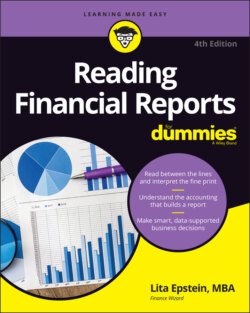Читать книгу Reading Financial Reports For Dummies - Lita Epstein - Страница 14
Seeing why financial reporting counts (and who's counting)
ОглавлениеMany people count on the information companies present in financial reports. Here are some key groups of readers and why they need accurate information:
Executives and managers: They need information to know how well the company is doing financially and to find out about problem areas so they can make changes to improve the company's performance.
Employees: They need to know how well they're meeting or exceeding their goals and where they need to improve. For example, if a salesperson has to make $50,000 in sales during the month, they need a financial report at the end of the month to gauge how well they did in meeting that goal. If they believe that they met the goal but the financial report doesn't show that they did, they must provide details to defend their production levels. Most salespeople are paid according to their sales production. Without financial reports, they'd have no idea what their compensation is based on.Employees also make career and retirement investment decisions based on the company's financial reports. If the reports are misleading or false, employees may lose most, if not all, of their 401(k) retirement savings, and their long-term financial futures may be at risk.
Creditors: They need to understand a company's financial results to determine whether to risk lending more money to the company and to find out whether the firm is meeting the minimum requirements of any loan programs that are already in place. To find out how creditors gauge whether a business meets their requirements, see Chapters 9 and 12.If a firm's financial reports are false or misleading, creditors may loan money at an interest rate that doesn't truly reflect the risks they're taking. And by trusting the misleading information, they may miss out on a better opportunity.
Investors: They need information to judge whether a company is a good investment. If investors think that a company is on a growth path because of the financial information it reports, but those reports turn out to be false, investors can pay, big time. They may buy stock at inflated prices and risk the loss of capital as the truth comes out, or they may miss out on better investing opportunities.
Government agencies: These agencies need to be sure that companies comply with regulations set at the state and federal levels. They also need to be certain that companies accurately inform the public about their financial position.
Analysts: They need information to develop analytical reviews for clients who are considering the company for investments or additional loan funds.
Financial reporters: They need to provide accurate coverage of a company's operations to the general public, which helps make investors aware of the critical financial issues facing the company and any changes the company makes in its operations.
Competitors: Every company's bigwigs read their competitors’ financial reports. If these reports are based on false numbers, the financial playing field gets distorted. A well-run company could make a bad decision to keep up with the false numbers of a competitor and end up reducing its own profitability.
Companies don't produce financial reports only for public consumption. Many financial reports are prepared for internal use only. These internal reports help managers accomplish these tasks:
Find out which of the business's operations are producing a profit and which are operating at a loss
Determine which departments or divisions need to receive additional resources to encourage growth
Identify unsuccessful departments or divisions and make needed changes to turn around the troubled section or kill the project
Determine staffing and inventory levels needed to respond to customer demand
Review customer accounts to identify slow-paying or nonpaying customers, to devise collection methods and develop guidelines for when a customer should be cut off from future orders
Prepare production schedules and review production levels
This list identifies just a few of the many uses companies have for their internal financial reports. The actual list is endless and is limited only by the imagination of the executives and managers who want to find ways to use the numbers to make business decisions. I talk more about using internal reports to optimize results in Chapters 14 and 15.
